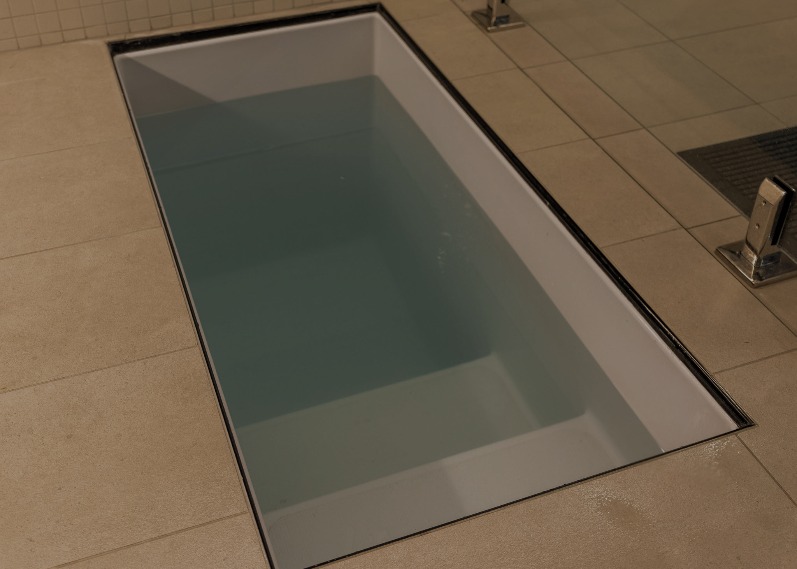Here is all you need to know about this treatment:
WHAT MAKES COLD THERAPY AN EFFECTIVE TREATMENT FOR DEPRESSION?
Cold therapy is effective for depression because when you submerge yourself in cold water, the freezing temperature changes the way your nervous system communicates with your brain.
Coldwater therapy treatments include ice baths, hydrotherapy, a cold shower, and cryotherapy ice chambers. These are effective as they have a shock effect on your body; this then activates electrical nerve impulses from your brain to your nervous system.
Cold water immersion has been shown to have very similar effects on the body as anti-depressants do.
HOW DOES COLD THERAPY FOR STRESS, ANXIETY AND DEPRESSION WORK?
Cold therapy works for depression in various ways, from boosting your immune system to managing anxiety and significantly affecting your hormones.
LOWERS ANXIETY LEVELS
One of the most consistent and profound physiological responses to cold exposure is a robust release of norepinephrine into the bloodstream. Norepinephrine is a key player in the mood and cognitive-enhancing effects of cold exposure. Norepinephrine is a neurotransmitter involved in mood, focus and attention. Generally, lower norepinephrine activity is associated with inattention, decreased focus and cognitive ability, low energy, and poor mood. Both ADHD and depression are sometimes treated with norepinephrine reuptake inhibitors, but these drugs carry some risks.
Ice baths have been shown to increase norepinephrine levels in the body post ice bath.
REDUCES STRESS
Cold water can help lower your cortisol, which is the stress hormone, and when it is lowered, you will feel much more relaxed.
Cold exposure also stimulates the vagus nerve; this nerve forms the main nerves of your entire parasympathetic nervous system, which controls your immune system, heart function, and digestion. And this nerve tells your body to relax and de-stress when it is stimulated.
Being exposed to cold temperatures can also improve the way your mind copes with stressful changes and environments; it can also train your mind deal being in a physical stressor and can use that for mental stress as well.
Breathing exercises are essential when going for a cold plunge or taking ice baths, and getting into a good breathing rhythm can help reduce symptoms of stress, and you learn how to handle uncomfortable situations a lot better.
DECREASES DEPRESSION SYMPTOMS
After adults who had been diagnosed with depression underwent ten cryotherapy sessions, they showed marked reductions in their depressive symptoms and improved quality of life, mood, and disease acceptance, suggesting that whole-body cryotherapy is beneficial for mental well-being and quality of life. Study
ICE BATHS FOR DEPRESSION: WHAT DOES THE RESEARCH SAY?
Various studies and research have found that ice baths are an effective treatment for depression. The treatment consists of cold showers at 20°C for 2 to 3 minutes.
Then, participants made a gradual adaptation for five minutes to decrease the cold shock response; this can be done 1 to 2 times every day. This course of treatment should go on for a couple of weeks to several months.
The research showed that exposure to cold temperatures activates one’s sympathetic nervous system and increases bloodstream levels of noradrenaline and beta-endorphin to increase the synaptic release of noradrenaline in your brain.
And since there are so many cold receptors in our skin, cold showers or cold water swimming sends a considerable amount of electrical impulses from the brain’s peripheral nerve endings, which can have an anti-depressant effect.
The overall research showed that cold hydrotherapy can decrease the symptoms of depression.
ARE ICE BATHS FOR STRESS, ANXIETY AND DEPRESSION THE RIGHT TREATMENT FOR YOU?
There are various treatments for depression, and what may be effective for one person may not be as effective for another since everyone is unique. But ice baths for stress, anxiety and depression have shown to be highly beneficial, and studies have shown how effective they can be.
If you suffer from a major depressive disorder, it is worth trying out. Cold water is uncomfortable, and it will be challenging, but everything takes a little getting used to, and you won’t regret giving it a go and seeing if it works for you.
FAQS
WHAT DOES AN ICE BATH DO TO YOUR BRAIN?
Ice baths improve your mood and brain function and cause an increase in endorphins. Ice baths stimulate your parasympathetic and sympathetic nervous system and your stress response; this causes a natural high, which boosts your attitude and mood.
HOW LONG SHOULD YOU ICE BATH FOR?
You should ice bath for no longer than 15 minutes. Any longer than this puts you at risk of hyperthermia and frostbite. Ten to fifteen minutes is the perfect amount of time so that your body can fully benefit from the effects of an ice bath.
CAN YOU ICE BATH EVERY DAY?
Yes you can. It all depends on how active you are and how intense your workouts are. It is highly popular in many communities to ice bath everyday, not just for the physical benefits but for the mental clarity and mood boost that it provides.
But everything you do is more beneficial if you do it regularly. Some people take an ice bath once a month, some twice a day, and some for multiple days in a row – always listen to your body, though, and do not put it through anything it cannot cope with.
HOW LONG AFTER AN ICE BATH CAN I SHOWER?
Avoid taking a shower immediately after, as this will likely diminish the effects of the ice bath, and the sudden heat can negate the benefits of the ice. It is best to wait about two hours before having a warm shower. You can however, drink a warm tea or put on warm clothes.
FINAL THOUGHTS
Cold water immersion has shown to be highly effective in treating depression and anxiety, and even various mood disorders. It is a very different approach to what most people are used to, but there is nothing wrong with trying something new.
The idea of submerging yourself in ice-cold water for 10- 15 minutes does not sound incredibly appealing. However, when you start benefiting from its effects, you will realize it is worth it. All it takes is some adapting to and slow, deep breathing.




